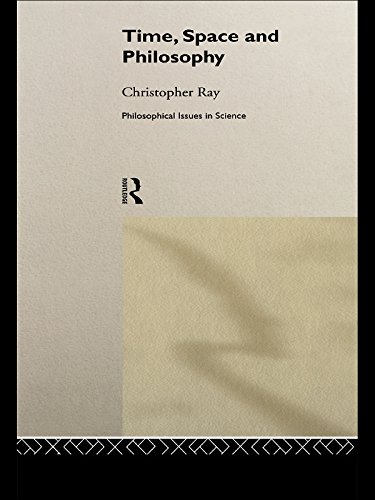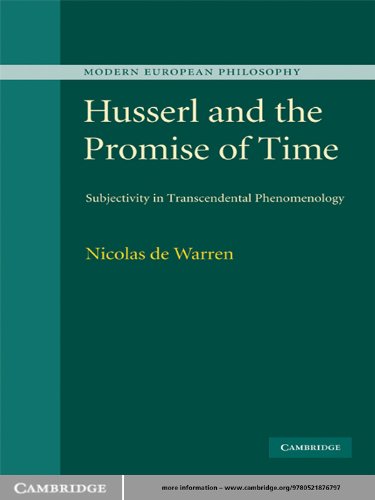
By Gianni Vattimo,Santiago Zabala
88 Keys To Unlocking The Enlightened Soul (Sacred Earth by Torrey Lystra
By Torrey Lystra
Melancholy and the Otherness of God: A Study in the by Alina Feld

By Alina Feld
Time, Space and Philosophy (Philosophical Issues in Science) by Christopher Ray

By Christopher Ray
Ray considers intimately the significant questions of house and time which arizse from the tips of Zeno, Newton, Mach, Leibniz and Einstein. Time, house and Philosophy extends the controversy in lots of areas:absolute simultaneity is tested in addition to black holes, the massive bang or even time travel.
Time, house and Philosophy should be helpful to the coed of philosophy and technological know-how and may be of substantial curiosity to arithmetic scholars. The transparent, non-technical procedure also needs to make it appropriate to for the overall reader.
Free Will, Agency, and Meaning in Life by Derk Pereboom
By Derk Pereboom
to reason judgements with out being causally decided to reason them—we could have this sort of loose will. yet even though our being undetermined agent factors has now not been governed out as a coherent threat, it is not credible given our greatest actual theories. Pereboom then contends perception of
life with out the unfastened will required for ethical accountability within the basic-desert feel could however permit for a distinct, forward-looking notion of ethical accountability. He additionally argues that our missing this kind of unfastened will wouldn't jeopardize our experience of ourselves as brokers able to rational deliberation, that it's appropriate with enough measures for facing crime and different threatening habit, and that it allows a powerful feel of accomplishment and that means in life.
Pereboom's arguments for this place are reconfigured relative to these offered in dwelling with out unfastened Will (2001), vital objections to those arguments are responded, and the improvement of the confident view is considerably embellished.
The Power of Negativity: Selected Writings on the Dialectic by Raya Dunayevskaya,Peter Hudis,Kevin B. Anderson
By Raya Dunayevskaya,Peter Hudis,Kevin B. Anderson
Understanding Scientific Progress: Aim-Oriented Empiricism by Nicholas Maxwell
By Nicholas Maxwell
"Understanding medical growth constitutes a most likely huge, immense and progressive development in philosophy of technological know-how. It merits to be learn and studied through every person with any curiosity in or reference to physics or the speculation of technology. Maxwell cites the paintings of Hume, Kant, J.S. Mill, Ludwig Bolzmann, Pierre Duhem, Einstein, Henri Poincaré, C.S. Peirce, Whitehead, Russell, Carnap, A.J. Ayer, Karl Popper, Thomas Kuhn, Imre Lakatos, Paul Feyerabend, Nelson Goodman, Bas van Fraassen, and diverse others. He lauds Popper for advancing past verificationism and Hume’s challenge of induction, yet faults either Kuhn and Popper for being not able to teach that and the way their paintings may lead closer to the truth." —Dr. Lloyd Eby teaches philosophy on the George Washington collage and The Catholic college of the US, in Washington, DC
"Maxwell takes up the philosophical problem of the way traditional technological know-how makes development and gives an excellent remedy of the matter by way of the distinction among conventional conceptions and his personal scientifically-informed theory—aim-oriented empiricism. This transparent and rigorously-argued paintings merits the eye of scientists and philosophers alike, particularly those that think that it's the accumulation of information and know-how that solutions the question."—Leemon McHenry, California nation college, Northridge
"Maxwell has distilled the best essence of the medical company. technology is ready making the realm a greater position. occasionally technological know-how loses its manner. the longer term is determined by scientists doing the proper issues for the perfect purposes. Maxwell's Aim-Oriented Empiricism is a map to place technology again at the correct track."—Timothy McGettigan, Professor of Sociology, Colorado kingdom college - Pueblo
"Maxwell's aim-oriented empiricism is for my part a really major contribution to the philosophy of technology. i'm hoping that it'll be generally mentioned and debated." -- Alan Sokal, Professor of Physics, big apple University
Husserl and the Promise of Time: Subjectivity in by Nicolas de Warren

By Nicolas de Warren
Meditations on First Philosophy/ Meditationes de prima by René Descartes,George Heffernan
By René Descartes,George Heffernan
Enlightened Mind, Divine Mind: Notebooks: Volume 16 (The by Paul Brunton
By Paul Brunton